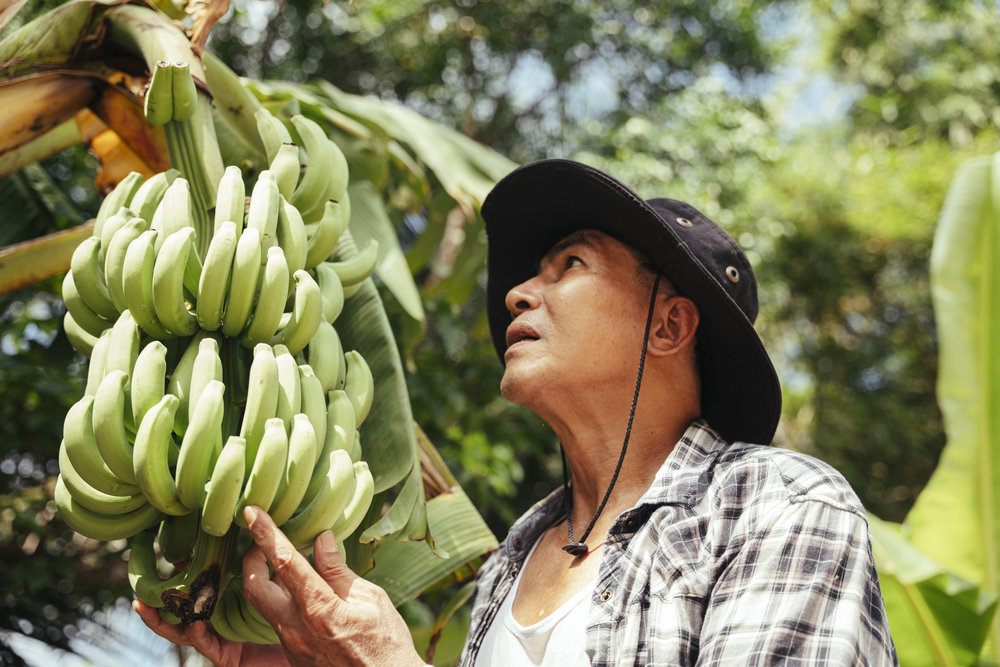Bananas are the fourth most produced food crop in the world after wheat, rice and corn, and the fifth most consumed unprocessed crop on the planet.

San Jose, 17 February 2021 (IICA). Bananas, an economic mainstay for thousands of small-scale farmers and their families in tropical regions, are currently under threat. A disease that originated in Southeast Asia, which wilts and kills the crop, has spread to plantations around the world.
This issue greatly affects vulnerable populations. Far from being a technical issue that should attract the attention of agricultural market experts specifically, it poses a real risk to the livelihoods of countless family farmers in Latin America and the Caribbean (LAC).
In LAC, bananas are one of the few crops that provide income year-round for rural dwellers.
For this reason, experts –among them, scientists Gert Kema and Chelly Hresko, two of the specialists who have conducted the greatest amount of research on this topic in the world- recommend as crucial a coordinated action of governments, the private sector and technical cooperation organizations guided by science so that the disease is contained and production can continue.
The Tropical Race 4 (TR4) strain of the Fusarium fungus is a soil-borne disease that resists fungicides. At present, there is no known cure, and the only solution to stop the spread of the disease is to burn entire banana plantations, rendering them unusable and leading to the loss of thousands of hectares of fertile land.
Although TR4 does not affect human health or pose a risk to those who eat bananas, it can destroy entire plantations of this crop, on which thousands of rural families in 135 countries around the world—including many in LAC—depend on for income.
It is a pandemic that is not often discussed, but that could have a devastating impact on the well-being of rural populations, on jobs and on global food security.
A situation humanity has already experienced
To some extent, the emergence and spread of TR4 is reminiscent of a situation that took place during the first half of the 20th century, when another fusarium strain, Race 1, wiped out the Gros Michel banana species—previously the most widespread banana variety.
This led to the expansion of the Cavendish variety, which was naturally resistant to the disease, and the transformation of global banana production. It soon became clear that this alternative was successful; in fact, over the past seven decades, the Cavendish banana species has been grown on monoculture plantations. At present, this variety accounts for half of the world’s banana production and 95% of banana exports.
In LAC, local markets and large chains only sell the Cavendish variety, which is now gravely threatened by TR4, exposing its fragility.
Guaranteeing the sustainability of banana production is important for many reasons.
On the one hand, the majority of crops grown by small-scale farmers are sold to local markets or consumed by famers themselves, which means these farmers play a key role in feeding the population. In fact, bananas are the fourth most produced food crop in the world (after wheat, rice and corn) and the fifth most consumed unprocessed crop in the world.
The crop’s importance for global food security is undeniable: 90% of bananas are consumed in developing countries, where the crop accounts for one-fourth of the daily calorie intake of approximately 400 million people.
The need to take action
Although it was first detected in Jordan, in the Middle East, the TR4 disease originated in Southeast Asia and then began to spread westward. Bananas are grown on five continents, so the spread has been rapid. In a short amount of time, the disease reached India, Pakistan and even Mozambique in East Africa, next to the Indian Ocean.
With more than 15 countries affected, experts understood that, sooner or later, the disease would reach Latin America and the Caribbean, where countries such as Brazil, Ecuador, Guatemala, Colombia and Costa Rica are major banana producers and whose economies depend heavily on the crop. LAC countries are leading global banana exporters and their most important customers are industrialized countries.
Colombia was the first country to detect the disease on our continent, in 2019. That year, the Colombian Agricultural Institute (ICA) announced that some 175 hectares in the northern region of the country had been affected. As a precautionary measure, the crop was eradicated in the affected territory; shortly thereafter, molecular and genetic analyses carried out by Wageningen University in the Netherlands confirmed the diagnosis.
Colombia quickly declared a national emergency and set off alarms throughout the region.
Although there is no conclusive information, experts agree that the disease is transmitted by people who move from one plantation to another, often in different countries, unknowingly wearing contaminated clothing or carrying other contaminated items.
Today, the priority is to generate scientific knowledge and improve capacities among small-scale producers, so that they can assist in containing the disease through adequate hygiene and other precautionary measures.
It is also paramount to raise awareness of this situation, which could worsen if it is not addressed. Experts estimate that almost 20% of the world’s banana plantations could be affected by TR4 by 2040.
Now is the time to take action; a key source of income and food for hundreds of thousands of people is at stake.
More information:
Institutional Communication Division, IICA.
comunicacion.institucional@iica.int











